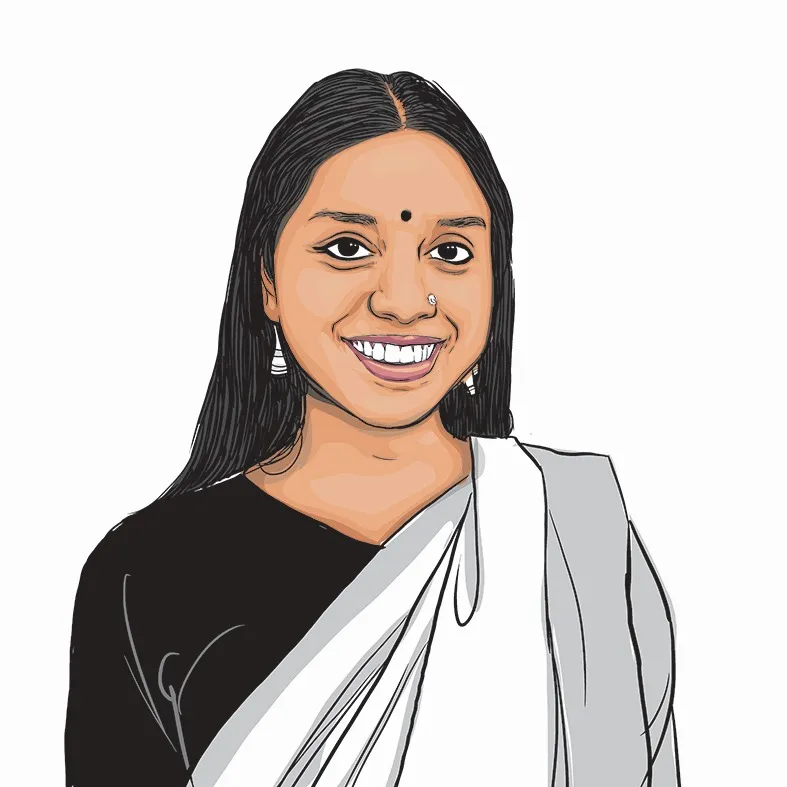Opinion Pollution has turned Delhi’s romantic winters into something that seems like dystopian fiction
School is about so much more than just academics — it’s about socialising, sitting outside in the fields, chatting with friends, and sharing moments of joy alongside learning. The attacks on health, the isolation, and monotony of pollution-filled days are transforming. I have not even mentioned primary school students, the first to be shut in their homes
 Delhi’s romantic winters have turned into something that feels like dystopian fiction. I cannot help but wonder: Will students ever experience the winters we grew up with? (Express photo)
Delhi’s romantic winters have turned into something that feels like dystopian fiction. I cannot help but wonder: Will students ever experience the winters we grew up with? (Express photo) In my childhood, winters meant spending the entire morning outdoors on our narrow balcony, basking in the sun and munching on fruits, peanuts, and gur. It was also the season for picnics in Nehru Park, filled with badminton matches, lazy siestas, quality time with the family, delicious pulao, nimbu paani for the children, and chai for the adults.
I remember my first year of college in 2014 when concerns about pollution started spreading across the city like a shroud. For the first time, I had to buy a mask. Nearly a decade later, with a mask on, I find myself on my way to work on what feels like the first day of winter. The air carries a crisp nip, reminding me that it is time to pack away the summer cottons and dig out the woollens. The sky appears gloomy, giving the impression of an overcast day, but my allergies confirm that this is far from the reality.
As I enter the staffroom, I am convinced that today’s class should focus on Delhi’s air pollution. Students need to understand what winters once looked like, and examine the systemic causes behind the current disarray. We sit in an air-purified room, with an AQI monitor ominously flashing indicators of poor air quality. I begin the discussion by sharing my memories of childhood winters, only to realise that my students, who were just five or six years old a decade ago, have no recollection of Delhi winters without the smog.
With a sense of sorrow, I share the assignment for the day which is composed of excerpts from an article explaining Monsanto’s role in the pollution crisis, emphasising how systemic failures and policies, rather than common assumptions like Diwali crackers, are at the root of the problem. As a Sociology teacher, the aim is to help them uncover how individual concerns often stem from larger structural issues, thereby connecting the individual with society.
Looking at the empty classrooms, the pernicious effects of pollution become all too apparent. Its impact on health gets written about. But what of the impact on their minds? Senior school students, though physically present in school just before the announcement of a complete shutdown of physical school, have missed their physical education and other activity classes, forcing them to sit indoors. Their outdoor lessons have been replaced by study sessions, creating mental and physical stress. While some schools have air purifiers installed, the majority do not, leaving teachers and students to brave the conditions.
Online classes, introduced as a temporary solution, bring back horrid memories of the pandemic lockdowns.“Please switch on your cameras”, “Can you hear me?”, and fretting over potential power outage, once again intersperse class discussions. Not to mention the inequalities that online classes create between those who have easy access to gadgets and WiFi, and those who do not. When asked how they feel about online learning, most students described it as “mid” in their Gen Z slang, while others outright disliked it. Not a single student claimed to enjoy this arrangement.
School is about so much more than just academics — it’s about socialising, sitting outside in the fields, chatting with friends, and sharing moments of joy alongside learning. The attacks on health, the isolation, and the monotony of these days are transforming. And I have not even mentioned the primary school students who have been the first to be shut in their homes. Who have not met their friends or stepped out to play in the sun. Some born during the pandemic, are being socialised into a world where having online classes is normal. As a child, I remember schools being closed for reasons like heavy rainfall or extreme cold, and these unexpected holidays brought so much joy. However, now such announcements often come with the shift to online classes. While this approach ensures continuity of learning, it also impacts students’ well-being as they must quickly adapt and adjust to a new mode of learning, unsure of when government restrictions would be extended or reversed.
Fresh air is not let in by opening windows, but by being shut indoors. Delhi’s romantic winters have turned into something that feels like dystopian fiction. I cannot help but wonder: Will students ever experience the winters we grew up with?
The writer is a Sociology teacher in a Delhi school






